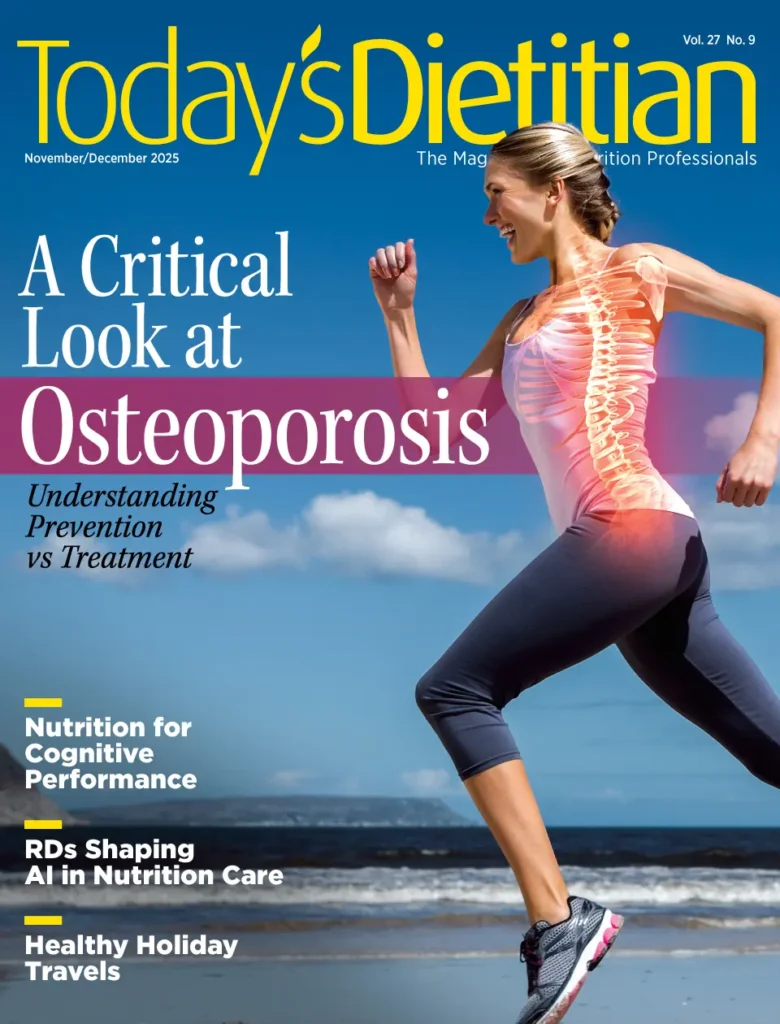With the older adult population growing worldwide, research on diseases associated with cognitive decline and aging, such as dementia, has shifted to the forefront. Particular focus has been given to prevention efforts, with some studies suggesting lifestyle factors such as physical activity and diet may reduce dementia risk.
An article in the June 2019 issue of Today’s Dietitian highlights research showing the potential neuroprotective effects of dietary patterns such as the Mediterranean and Mediterranean-DASH Intervention for Neurodegenerative Delay (MIND) diets, while acknowledging that the research still has a ways to go. The study outlined below demonstrates the difficulty of establishing a direct link between diet and dementia risk.
A UK study that measured diet and cognitive decline over almost 25 years didn’t show an association between a more healthful diet in midlife and a lower risk of dementia later in life. The findings, published in JAMA, are the first to examine the prospective association of diet quality in midlife with later life risk of developing dementia with a follow-up of more than 10 years.
Previous observational studies with shorter follow-up periods have shown a relationship between diet and cognitive decline, brain volume, and dementia risk, but intervention studies haven’t shown an effect. The authors of the UK study question the value of follow-up periods of less than 10 to 15 years, pointing to dementia’s long preclinical period. Fifteen to 20 years before dementia is diagnosed, various pathophysiological changes, such as cognitive decline, mood changes, and depression, occur; these are likely to affect diet and lifestyle choices and, they argue, potentially limit results of observational studies.
In this analysis, supported by the US National Institutes of Health’s National Institute on Aging, researchers rated the self-reported diets of 8,225 participants (mean age 50 years in 1991–1993) in Whitehall II, also known as the Stress and Health Study. Participants completed dietary questionnaires at three different time periods. Researchers used the Alternative Healthy Eating Index—an 11-component diet quality score—to score and index the quality of participants’ midlife diets.
Over a 24.8-year median follow-up period, 344 participants (average age 75.6) were diagnosed with dementia, as identified through electronic health records from the United Kingdom’s National Health Service. When researchers compared dementia incidence rates with diet quality, they found no significant associations. Researchers also found no associations between diet and cognitive decline.
During analysis, researchers controlled for several factors, including sociodemographics, behavioral risk factors, and certain health conditions. The diet quality metric used in this study didn’t show any effect over and above other risk factors, such as high blood pressure and diabetes, that themselves may be in part attributable to diet.
These findings don’t contradict the possibility that a diet specifically designed to promote brain health, such as the MIND diet and some versions of the Mediterranean diet, could have any beneficial effect. Indeed, the Mediterranean diet and its variations, such as in the PREDIMED and CARDIA studies, have been shown to improve auditory verbal learning, memory, processing speed, and executive function.1,2 The JAMA study does suggest that some positive effects of better diets on cognition might be due to their direct effect on known risk factors that aren’t brain specific, eg, high blood sugar or high blood pressure.
— Source: National Institute on Aging
References
1. Valls-Pedret C, Sala-Vila A, Serra-Mir M, et al. Mediterranean diet and age-related cognitive decline: a randomized clinical trial. JAMA Intern Med. 2015;175(7):1094-1103.
2. McEvoy CT, Hoang T, Sidney S, et al. Dietary patterns during adulthood and cognitive performance in midlife: the CARDIA study. Neurology. 2019;92(14):e1589-e1599.


